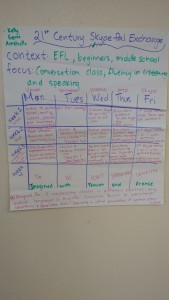In Friday’s class Peter introduced project based learning tasks, skills and designing. He used a lot of problem solving and interpersonal skills to help us learn about project based learning on our own. He used three activities to help us understand different approaches and frameworks for designing project-based instruction.
The first activity had us working in groups to match various project related vocabulary to their definitions. There were approximately 20 phrases with paired definitions. Peter walked around to check in with groups and help with the pairings. He asked students to report some of the pairings after.
The next activity had us organizing small pieces of paper with brief descriptions of projects on them. We first organized them into 3 categories: unit projects, course long projects or both. Using the same project descriptions we worked together to reorganize them into four categories relating to the kind of community interaction that the project encourages: classroom, classroom and campus, classroom and local community, and classroom and the global community.
The final activity was a play on apples-to-apples. Each group was given 2 sets of cards. One with a description of the contexts that could have project based learning activities and the other with a description of projects that could potentially be applied to those contexts. There were also wild cards in this category which could only be used if the player made up a project. The game proceeded with each player submitting a project to the newly turned over context cards. We would vote on the best pair and the player that added that project card would get the cards.
Finally, Peter had us collaboratively create our own projects after looking at several example overviews of projects.
Below is the lesson that we created.
Annabelle, Gerri, and I wanted to create a project-based course that would be applicable to our future career goals. We all wanted to focus on EFL (teaching abroad). We all had experience teaching beginners but at different ages; we compromised and chose to focus on middle school.
We designed this project for classrooms that are in an area with limited access to native speakers of English and need to improve their speaking and listening fluency in a conversation course. We imagined co-planning between two countries where the only mutual language would be English, but the learner’s proficiency and ages were very similar. The conversation course would focus on cross-cultural relations and awareness.
This project is designed to be started a few weeks into the beginning of the semester where students are producing and memorizing basic sentences. The first week of the project would be to introduce the partner school and explain to the students that they will be receiving a “Skype-Pal” to practice conversation with. The first week prepares them for the Skyping interaction and activating the country/culture previous knowledge. The following weeks all follow the same format with slight variation in activities to reduce repetition while still maintaining scaffolding.
Mondays focus on reflecting on previous week’s Skype session and introducing new vocabulary for the given topic (Food, hobbies, holidays, family, around the house, around the school, etc.). Tuesdays will focus on reviewing vocabulary and introducing sentence structures/grammar patterns. Wednesdays will be “practice with a partner” day; getting the students used to producing the language. Thursdays will be “prep” days in which they think about the possible questions they will ask their Skype partners and make predictions about what will be the same and different between the two countries. Fridays will be dedicated to Skyping and note taking on their partner’s responses.
The semester ends with an oral presentation/introduction of their language partner using all the vocabulary and conversations learned over the term.
We hope this project will be helpful for other English teachers who are teaching conversation classes abroad! We think it can be highly adaptable for different levels and topic of conversation.
We felt that Peter’s lesson was a well scaffolded introduction to project based learning. The activities allowed us to see examples of different kinds of projects and understand the goals, times frames and settings that would be appropriate for those projects. We also felt the opportunity to practice curriculum and project planning was very useful for our own understanding of how to begin the project based learning process.
-Kelly, Annabelle, and Gerri



